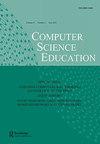“I remember how to do it”: exploring upper elementary students’ collaborative regulation while pair programming using epistemic network analysis
IF 2.2
Q1 EDUCATION & EDUCATIONAL RESEARCH
引用次数: 0
Abstract
ABSTRACT Background and Context Students’ self-efficacy toward computing affect their participation in related tasks and courses. Self-efficacy is likely influenced by students’ initial experiences and exposure to computer science (CS) activities. Moreover, student interest in a subject likely informs their ability to effectively regulate their learning in that domain. One way to enhance interest in CS is through using collaborative pair programming. Objective We wanted to explore upper elementary students’ self-efficacy for and conceptual understanding of CS as manifest in collaborative and regulated discourse during pair programming. Method We implemented a five-week CS intervention with 4th and 5th grade students and collected self-report data on students’ CS attitudes and conceptual understanding, as well as transcripts of dyads talking while problem solving on a pair programming task. Findings The students’ self-report data, organized by dyad, fell into three categories based on the dyad’s CS self-efficacy and conceptual understanding scores. Findings from within- and cross-case analyses revealed a range of ways the dyads’ self-efficacy and CS conceptual understanding affected their collaborative and regulated discourse. Implications Recommendations for practitioners and researchers are provided. We suggest that upper elementary students learn about productive disagreement and how to peer model. Additionally, our findings may help practitioners with varied ways to group their students.“我记得怎么做”:利用认知网络分析探索高年级小学生在配对编程时的协同调节
背景与背景学生的计算机自我效能感影响其对相关任务和课程的参与。自我效能感可能受到学生的初始经验和接触计算机科学活动的影响。此外,学生对某一学科的兴趣可能会影响他们在该领域有效调节学习的能力。提高对计算机科学兴趣的一种方法是使用协作结对编程。目的探讨小学高年级学生在结对编程过程中的协作话语和调节话语中对计算机科学的自我效能感和概念理解。方法对四、五年级学生进行为期五周的计算机科学干预,收集学生计算机科学态度和概念理解的自我报告数据,以及在结对编程任务中解决问题时的对话记录。发现学生的自我报告数据按二人组进行整理,根据二人组的CS自我效能和概念理解得分分为三类。来自内部和跨案例分析的发现揭示了二人组的自我效能感和CS概念理解影响其协作和规范话语的一系列方式。为从业人员和研究人员提供了建议。我们建议小学高年级学生学习生产性分歧和同伴模式。此外,我们的发现可以帮助从业者以不同的方式对他们的学生进行分组。
本文章由计算机程序翻译,如有差异,请以英文原文为准。
求助全文
约1分钟内获得全文
求助全文
来源期刊

Computer Science Education
EDUCATION & EDUCATIONAL RESEARCH-
CiteScore
6.90
自引率
3.70%
发文量
23
期刊介绍:
Computer Science Education publishes high-quality papers with a specific focus on teaching and learning within the computing discipline. The journal seeks novel contributions that are accessible and of interest to researchers and practitioners alike. We invite work with learners of all ages and across both classroom and out-of-classroom learning contexts.
 求助内容:
求助内容: 应助结果提醒方式:
应助结果提醒方式:


